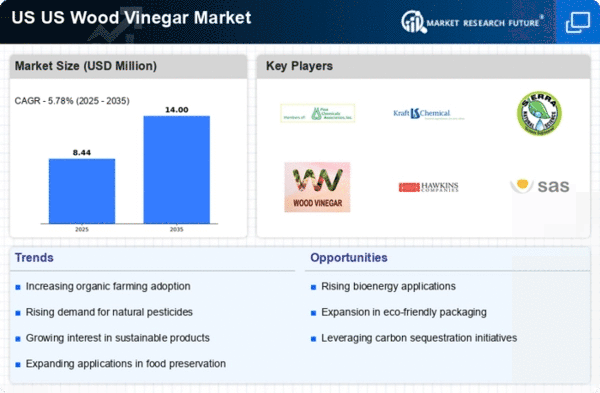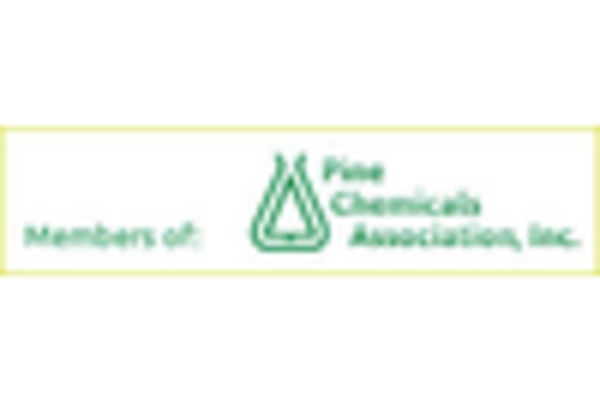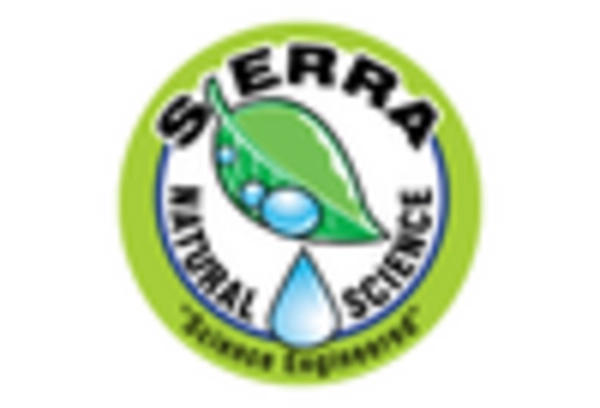Sustainable Agriculture Practices
The US Wood Vinegar Market is experiencing a notable surge due to the increasing adoption of sustainable agriculture practices. Farmers are increasingly recognizing the benefits of wood vinegar as a natural soil amendment and pest deterrent. This organic product enhances soil health, promotes plant growth, and reduces reliance on synthetic fertilizers and pesticides. According to recent data, the organic farming sector in the United States has seen a growth rate of approximately 12% annually, which correlates with the rising demand for wood vinegar. As more agricultural producers seek eco-friendly solutions, the market for wood vinegar is likely to expand, driven by the need for sustainable farming methods that align with environmental conservation goals.
Rising Demand for Bio-based Products
The US Wood Vinegar Market is poised for growth as the demand for bio-based products continues to rise. Consumers are increasingly inclined towards natural and organic products, which has led to a shift in purchasing behavior. Wood vinegar, derived from the pyrolysis of wood, is gaining traction as a versatile bio-based product used in agriculture, horticulture, and even food preservation. Market data indicates that the bio-based product market in the US is projected to reach USD 500 billion by 2027, reflecting a compound annual growth rate of 10%. This trend suggests that wood vinegar will play a crucial role in meeting consumer preferences for sustainable and environmentally friendly alternatives.
Regulatory Support for Organic Farming
The US Wood Vinegar Market benefits from robust regulatory support for organic farming practices. The USDA has established guidelines that promote the use of organic inputs, including wood vinegar, which is recognized for its efficacy in enhancing soil fertility and pest management. This regulatory framework not only encourages farmers to adopt organic practices but also provides a level of assurance to consumers regarding the safety and quality of organic products. As the organic sector continues to expand, the demand for compliant inputs like wood vinegar is expected to rise, further solidifying its position in the market. The alignment of regulatory policies with market needs indicates a favorable environment for the growth of wood vinegar.
Technological Advancements in Production
The US Wood Vinegar Market is benefiting from technological advancements in the production of wood vinegar. Innovations in pyrolysis technology have led to more efficient and cost-effective methods of producing high-quality wood vinegar. These advancements not only improve the yield and purity of the product but also reduce the environmental footprint of the production process. As production costs decrease, the accessibility of wood vinegar to a broader range of agricultural producers increases. Market analysis indicates that the introduction of new technologies could potentially double the production capacity of wood vinegar within the next five years. This growth in production capabilities is likely to meet the rising demand and solidify wood vinegar's role in sustainable agriculture.
Increased Awareness of Environmental Impact
The US Wood Vinegar Market is witnessing growth driven by heightened awareness of environmental issues among consumers and producers alike. As concerns regarding climate change and environmental degradation become more pronounced, there is a growing preference for products that contribute to sustainability. Wood vinegar, known for its ability to improve soil health and reduce chemical runoff, aligns well with these environmental goals. Recent surveys indicate that over 70% of consumers are willing to pay a premium for eco-friendly products, which bodes well for the wood vinegar market. This shift in consumer mindset suggests that wood vinegar could become a staple in sustainable agricultural practices, further enhancing its market presence.

















